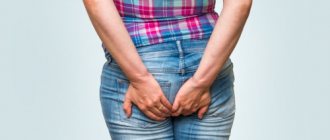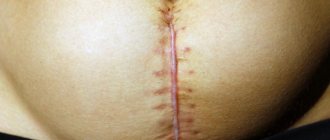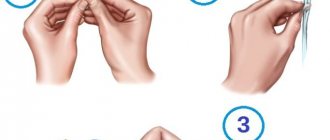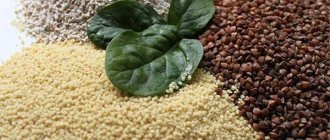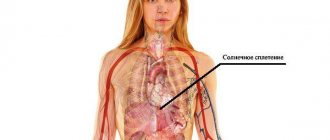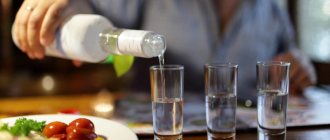Causes of the phenomenon when a burning sensation in the anus appears after diarrhea
In fact, many people experience discomfort after loose stools. Even children complain to their parents that after going to the toilet they sometimes “burn their bottom.” The main reasons why discomfort may occur after diarrhea:
- Presence of bacterial or viral infections;
- Failure to comply with personal hygiene rules;
- Presence of worms or parasites in the body;
- Diseases of the rectum;
- Frequent consumption of spicy foods;
- Venereal diseases;
- Injuries to the anus;
- Diabetes;
- Overweight;
- Diseases of the gastrointestinal tract;
- Stressful situations;
- Allergic reactions.
Causes of intestinal disorders in different categories of people
The causes of loose stools vary among people. Children suffer due to poor hygiene, parasitic infections, and mechanical damage.
The problem for pregnant women is diseases associated with the presence of bacteria or cracks that occur due to excessive pressure of the fetus on the pelvic part of the body. Common complaints of older people are diabetes, hemorrhoids, liver, pancreas, and gall bladder diseases.
Pain in the anus is often caused by pathogenic microorganisms. Bacteria and viruses have an irritating effect on the intestinal mucosa, causing increased bowel movements. When bacteria directly impact the irritated mucous membrane, a strong burning sensation is felt. If the cause of pain in the anus is a staphylococcal infection, then in addition to a burning sensation, a rash may appear on the skin. Diarrhea caused by bacteria or viruses is accompanied by an increase in temperature, the appearance of mucous lumps, and intoxication of the body.
Poor hygiene often causes anal discomfort. The burning sensation will intensify if a person does not pay enough attention to the hygiene of the anus or does not regularly change underwear. Toilet paper is not able to absorb the entire volume of liquid feces, some of which remains on the sensitive skin around the sphincter. When moving, the mixture of liquid and fecal particles leads to the formation of small lesions that cause a burning sensation. Poor hygiene leads to increased irritation caused by an increased number of bowel movements, accelerating the spread of infection and worsening well-being.
Severe pain after visiting the toilet, itching in the sphincter area is a characteristic phenomenon when infected with parasites and helminthic infestations. The most common “guests” of the human body are pinworms. Due to the toxins released, their presence is accompanied by frequent diarrhea. A person involuntarily scratches the skin around the anus, causing microcracks, redness, and irritation. Often the appearance of diarrhea is stimulated by Giardia, which interferes with the absorption of water and leads to intoxication of the body. Sometimes the intestines become the “place of residence” of parasites. The anus may begin to itch and burn even before the person suspects the presence of pathogenic microorganisms. It is worth paying attention to symptoms such as a strong feeling of hunger, general intoxication, and weight loss. If you have diarrhea, accompanied by the release of greenish mucus and an unpleasant, pungent odor, it is recommended to seek medical help. The sooner the parasite is identified, the more effective the treatment will be.
The anus may burn after diarrhea if a person has gastrointestinal diseases. Stomach diseases, tumors of various etiologies, polyps, fistulas, hemorrhoids, condylomas, warts often cause severe pain and burning after diarrhea. A stomach ulcer with hemorrhage also causes discomfort if the blood hardens and forms clots with sharp edges, which, when released, damage the sphincter. The disease is accompanied by an unpleasant odor of feces, vomiting, nausea, and the appearance of blood in the stool.
People with a taste for spicy foods are also advised to exercise caution. Moderate consumption will not cause harm to the body, but regular consumption irritates the mucous membranes of the intestines and rectum, which can cause acute pain and burning that does not stop for a long time.
Sexually transmitted diseases can cause a burning sensation in the anus after diarrhea. In people suffering from such diseases, specific discharge from the genitals is very pronounced. These secretions serve as a favorable background for the proliferation of bacteria and fungi, as a result of which pain with burning occurs during diarrhea. The most common is candidiasis. It causes not only severe discomfort in the genitals, but also irritation of the anus.
Even minor injuries to the anus can cause skin irritation during bowel movements. Problems may arise from wearing too-tight underwear, synthetic underwear, or using thick toilet paper. Using a razor to depilate around the anus can cause microcracks. If blood appears in the stool, you should be wary: bright scarlet blood indicates the presence of cracks, dark blood indicates hemorrhoids.
Such a serious disease as diabetes has a huge impact on the functioning of the entire body. The risk of diarrhea increases, firstly, since this disease has a detrimental effect on the digestive system. Secondly, diseases of the pancreas negatively affect the condition of the skin - it becomes dry and peeling occurs. After diarrhea, the skin around the anus dries even more, redness and irritation appear, which cannot be eliminated even by increased hygiene and the use of cream.
Diseases of the gallbladder, liver, and pancreas cause diarrhea, which soon becomes chronic. If intestinal disorders are caused by diseases of the liver or gall bladder, then enzymes, too acidic or alkaline bile, viruses, and bacteria may be present in the stool. These elements can cause burning and itching in the anus. An acute attack of pancreatitis causes diarrhea, the texture of stool changes, and pain around the sphincter may appear. The stool becomes loose and frequent, and its color is unpleasantly gray due to the presence of undigested fats. Due to increased bowel movements, the skin experiences irritation, which causes discomfort after visiting the toilet.
Causes of loose stools not related to disease
It happens that a person experiences acute pain around the anus for no apparent reason. In such cases, the issue may be overweight. Excess weight and obesity destabilize the normal functioning of the gastrointestinal tract, increasing the likelihood of diarrhea. People who are overweight suffer from increased sweating, which also irritates the skin around the anus, causing itching and burning.
The psycho-emotional state of a person has a strong impact on the condition of the skin and gastrointestinal tract. Constantly being in a stressful situation leads to the development of irritable bowel syndrome. This pathology enhances peristalsis, accelerating the elimination of food from the body. Chronic diarrhea occurs, causing pain, burning and itching around the anus. Emotional instability increases the sensitivity of the skin, dries it, aggravating the problem of itching in the anus.
Allergic reactions are another reason for discomfort after defecation. In addition to burning and redness, a rash is added. It is important to find out what exactly this reaction occurs to. The most common allergens may include food, household chemicals or hygiene products.
Why does itching and burning in the anus occur after diarrhea?
Negative feelings also cause:
- pain in the anus;
- itching around the anus;
- flatulenication.
If, after passing liquid stool, there is a burning, itching or pain in the anus area, then this needs to be dealt with.
Unpleasant sensations in the anus, diarrhea, depend on internal and external factors. The first ones influence physiological processes from the outside, the second ones disrupt them due to a painful condition.
The category of physiological reasons includes:
- excessive passion for cleanliness;
- neglect of basic hygiene rules;
- inaccurate depilation of the anus;
- poor food choices;
- low-quality toilet paper;
- allergy to cosmetic substances.
Occasionally, itching during diarrhea is provoked by antibiotics used to treat pancreatitis or diabetes. If the stool is very watery, then a burning sensation in the anus can be observed both before and after going to the toilet.
For diarrhea
Although you don’t need to push when you have diarrhea, the process of defecation itself often causes discomfort. This is explained by a rush of blood to the anus and the concomitant activation of nerve endings.
Another reason for burning with frequent bowel movements is the liquid consistency of the stool. They land on the tender areas around the anus, causing itching and tingling.
If you group all the causes of discomfort caused directly by bowel movement, you will get a list:
- Nutrition.
- Food with a bright and spicy taste - peppered, over-salted, pickled dishes. Such food, even after treatment with food enzymes, retains substances that activate receptors on the skin. Even a short exposure is enough to cause itching.
- Injuries to the external anal sphincter.
- Lesions on the sphincter, which open wide when straightened, deprive the internal tissues of protection. Liquid feces fall on exposed areas causing pain and burning.
- Inflamed hemorrhoidal node.
- In acute hemorrhoids, the nodes become inflamed, become larger and more painful. When blood also flows to them during defecation, any impact is fraught with trouble.
- Flatus.
- The release of excess gases through the anus during diarrhea causes liquid stool to splatter around the anus. When they get on the delicate skin of the perineum, they cause discomfort.
After diarrhea
The causes of burning after defecation are largely similar to the previous ones, but there are also differences.
Sometimes, the burning sensation during diarrhea is localized not in the anus, but in other places. Often preceding or accompanying loose stools. Understanding the causes of these phenomena helps in the treatment of diarrhea.
- Intestinal burning accompanied by frequent diarrhea is an additional symptom of several unpleasant diseases.
- The most dangerous thing is appendicitis, the main symptoms of which are:
- If these symptoms appear, you should immediately seek help from specialists.
- When determining the causes of a burning sensation in the stomach with diarrhea, you need to pay attention to:
- The nature of burning phenomena.
- Presence of additional symptoms.
- What factors cause itching?
Overeating or poor quality food are the main causes of loose stools and burning in the abdomen.
Metabolic disorders and stomach clogging can be added to the same list.
If you have a burning sensation in your mouth, you should immediately run to the doctor for a burning sensation in your mouth, because... this may be a sign of cancer.
Experts advise not to self-medicate. Use medications and folk remedies without consultation, only as a last resort.
Three categories of medications are used to treat anal discomfort:
- Antipruritic.
- Advantan;
- Fenistil;
- Skin Cap;
- Nezulin.
- Anti-inflammatory.
- Syntomecin;
- Levomekol;
- Eplan;
- Argosulfan.
- Wound healing.
- Radevit;
- Bepanten;
- Solcoseryl;
- D-panthenol.
Other groups of drugs and folk remedies will help in the treatment of diarrhea:
- Antidiarrheal
- Fixing.
- Enveloping.
- Astringents.
- Homeopathic.
- If alarm signals appear: bleeding, high fever, deterioration of the condition, you should immediately seek help from specialists.
Unpleasant sensations after diarrhea have many possible causes. In this case, not only irritation of the anus is detected, but the process is also accompanied by severe pain. Factors in the appearance of unpleasant symptoms are considered to be diseases that relate to inflammatory processes in various organs.
Some people don't pay attention to personal hygiene. This includes bad toilet paper. Poor quality personal hygiene attribute does not always absorb all liquid feces. Some of the stool remains on the skin near the sphincter. It is worth noting that the dermis of the anus is sensitive, and dried feces irritate the epithelium.
The symptoms become more noticeable after eating spicy foods. During diarrhea, you should not eat foods with spices, especially red pepper.
Otherwise, infection with viruses and bacteria occurs. At the same time, disease-causing pathogens are found in feces. Microorganisms enter the sphincter. In the anal area, they begin to multiply, producing exotoxins. These substances irritate the dermis, which is considered a factor in the occurrence of burning after diarrhea. In some cases, a rash appears.
Parasitic infestations
In some cases, a burning sensation in the anus with diarrhea appears due to infection with helminths. Along with the unpleasant sensation, severe pain occurs after defecation. In this case, the patient involuntarily scratches the skin near the sphincter. This leads to the formation of microcracks, which causes irritation. The area around the sphincter becomes red.
Parasites are mainly located in the intestines. The primary signs of worms in the body are itching and burning after defecation. With helminthiasis, the patient is accompanied by loose stools mixed with greenish mucus. Long-term parasitism of worms in the body not only causes discomfort, but also causes rumbling in the stomach. Feces have a pungent odor.
Diarrhea and burning sensation occur in the anus due to diseases that are sexually transmitted. In this case, not only such unpleasant sensations appear, but also characteristic discharge from the genital organs is detected. Secretory fluid creates favorable conditions for the proliferation of bacteria and fungi in the urinary system and anus. Moreover, after loose stools, not only a burning sensation occurs, but also the diseases are accompanied by severe pain.
Thrush or Candida fungus is considered a frequent manifestation with itching and burning. The sexually transmitted disease develops in both women and men under certain circumstances, irritating the genitals and anus. In individual cases, candidiasis occurs in children, which indicates transmission of the disease from the mother.
Any damage to the dermis or the appearance of cracks in the anus causes irritation during or after defecation. The provocateurs are:
- rough toilet paper;
- underwear made of synthetic material;
- tight or uncomfortable clothing.
The main factor causing microcracks is poor paper. If a person often has loose stools, he has to carefully wipe out the stool. Rigid paper does not allow this to be done properly, which causes cracks. This leads to irritation and redness in the area around the sphincter.
In some cases, hemorrhoids become the cause of discomfort. At the same time, blood stagnates in the adjacent capillaries. When a lot of it accumulates, the hemorrhoidal cone (part of the rectum) begins to protrude from the anus. This becomes the reason why itching and burning occurs after diarrhea. A hemorrhoidal lump, when it begins to protrude, becomes susceptible to any mechanical damage.
With hemorrhoids, many cracks appear around the anus. When a patient experiences diarrhea, inflammation of the damaged tissue occurs. The skin begins to become inflamed, and the process is repeated each time until comprehensive treatment is carried out.
Blood passes through the liver, where it is filtered. The organ helps collect toxins and harmful substances from it. The liver breaks them down and removes them from the body through the duodenum. If diarrhea occurs due to problems with the liver or gall bladder, then enzymes are found in the stool. At the same time, the mass gives off a sour or pungent odor. These factors cause a burning sensation after diarrhea.
In addition to unpleasant sensations, yellowing of the whites of the eyes is observed. The nails also appear yellow, as in the case of jaundice. The stool is black or contains blood in the loose stool.
When you have diabetes, the pathology has a negative impact on the entire body. This causes diarrhea. Diabetes mellitus affects the digestive system. In this case, the skin becomes dry and damaged from any mechanical impact.
Diagnostics
If, simultaneously with diarrhea, other unpleasant symptoms occur, for example, pain, burning, itching, fever, general deterioration, weight loss, you should immediately contact a proctologist for timely diagnosis. After clarifying complaints, collecting anamnesis, and conducting a mandatory examination, the following diagnostic measures should be carried out:
- General analysis of urine and blood;
- Blood sugar test;
- Blood chemistry;
- Fecal analysis for worm eggs;
- Sowing feces on flora;
- Coprogram;
- Colonoscopy;
- Sigmoidoscopy;
- Ultrasound of the gastroduodenal organs.
Should you see a doctor?
Vomiting blood in a child under one year old - symptoms of nausea
A child’s complaint that his butt hurts from the inside, even if it is expressed not in words, but in behavior (for example, tears, lack of appetite or a general restless state), is in itself a reason to consult a doctor. Even the most vague and subtle symptoms can hide a dangerous pathology. So that parents do not have to wonder in the foreseeable future why they were not concerned earlier, it is better to play it safe and show the baby to a pediatrician.
Even if a child experiences discomfort only during bowel movements, it would not be superfluous to conduct an examination, including not only an external examination, but also instrumental and laboratory diagnostics.
Don’t hesitate for a minute if your baby has at least one of the following symptoms:
- the presence of blood clots in the stool;
- constant or paroxysmal pain inside the butt;
- diarrhea or constipation does not go away for more than a day;
- the baby's body temperature rises;
- In addition to the butt, my stomach also hurts.
Don't be afraid to show your baby to the doctor
Treatment
Therapy should be based on the specific diagnosis causing the diarrhea.
- If an intestinal infection is detected - antiseptics and antibiotics orally, diet, drugs that help restore normal intestinal microflora.
- Parasitic and helminthic infestations are treated with anthelmintic drugs and agents active against Giardia.
- If the cause of the burning sensation is candidiasis, antifungal drugs are prescribed.
- Patients with diabetes should undergo treatment under the supervision of an endocrinologist with constant monitoring of sugar levels.
- The use of local heparin ointment and venotonics helps treat hemorrhoids.
- If intestinal upset is caused by a stressful situation, psychotherapy sessions and the prescription of sedatives are recommended. A moisturizer will help reduce itching and irritation of the skin.
- If the cause lies in an allergic reaction, the allergen should be excluded and antihistamines should be taken.
What treatment can be prescribed
Firstly, in order to be guaranteed to get rid of the discomfort after diarrhea and other disorders of normal digestion, it is necessary to cure the underlying disease, which was identified during a comprehensive examination of the whole body.
If a bacterial or viral intestinal infection is detected, drugs from a number of antibiotics and antivirals are prescribed.
The use of such medications is usually supplemented by the use of pro- and prebiotics, which help maintain normal intestinal microflora.
Helminthic and other parasitic infestations are treated by taking specific medications that have a serious toxic effect not only on the parasite's body, but also on the patient.
It is very important to find out the type of helminth before prescribing such a remedy, so as not to have a strong detrimental effect on the liver and other internal organs of a person by using broad-spectrum anthelmintic drugs.
After successfully destroying foreign organisms in the intestines, the patient is offered a laxative that helps get rid of dead worms and cleanse the gastrointestinal tract.
Acute and chronic inflammatory diseases of the digestive system require a more serious approach to the choice of treatment tactics.
It is important to determine why the inflammatory process occurred, whether it is a consequence of non-compliance with the correct diet or the presence of pathogenic microflora. In this case, specific treatment is prescribed.
Often, a burning sensation in the anus after cleansing the intestines can be caused by tumor growths in the rectum and anus.
If such pathological conditions are identified, the patient is offered surgery or other, more conservative treatment using special medications, radiotherapy and similar medical procedures.
Once the underlying disease has been identified and treatment has been prescribed, the doctor may recommend ointments and gels to eliminate microcracks or other damage in the anus that occur after long and frequent trips to the toilet.
Such medicines promote rapid healing, cooling, soothe and anesthetize the affected skin and mucous membranes.
In addition, the doctor prescribes a special gentle diet for the patient, excluding any spicy foods, fried meat and fish, fast food, legumes and other foods that require long-term treatment with enzymes and form large enough feces that can again cause mechanical damage to the skin and mucous membranes. shell.
Therapeutic enemas and physiotherapeutic procedures are also prescribed to increase the rate of healing of microcracks in the patient’s anus, eliminating burning, itching and redness.
After successful treatment of the problem, the patient should continue to eat properly and perform moderate physical activity.
A healthy lifestyle always remains the best prevention of such pathological conditions that can seriously change your usual life.
In addition, following a diet and doing health-improving physical exercises will normalize metabolic processes in the body, which will contribute to weight loss and eliminate some risk factors for the recurrence of discomfort after diarrhea.
Prevention
However, it should be remembered that the best treatment is prevention. You can protect yourself from diarrhea and its unpleasant consequences by following simple rules:
- Use soft toilet paper or napkins.
- Shower regularly after visiting the toilet.
- Once a year, prevent the appearance of pinworms and other parasites (medicines are sold freely in pharmacies).
- Wash your hands with soap after visiting public places, defecation, and before eating.
- Rinse vegetables and fruits thoroughly under running water.
- Adhere to the norms of proper nutrition, do not get carried away with fatty, fried, spicy, fast food.
- Minimize alcohol consumption.
- Carry out proper heat treatment of dairy products, meat, and fish.
- Monitor the expiration date of food products.
- Drink only boiled or filtered water.
If burning, itching, or redness of the skin occurs, it is extremely important to pay attention to personal hygiene. When choosing detergents and hygiene products, it is necessary to pay attention to the characteristics of the body and remember the possibility of an allergic reaction. It is important not only to eliminate diarrhea and the diseases that caused it, but also to control the condition of the skin around the anus.
Diarrhea is an unpleasant phenomenon that can last for a long time. It is accompanied by frequent and profuse bowel movements from 5 to 20 times a day. A burning sensation in the anus often appears after diarrhea. The reason for this unpleasant condition is the injury to the sphincter during diarrhea. However, severe itching, burning or pain may be signs of the disease. It is impossible to independently determine why the sphincter hurts after severe diarrhea. It is necessary to undergo an examination and see a doctor.
Methods for preventing burning
If you follow the simplest recommendations, you can prevent the occurrence of this phenomenon. So, for example, you should periodically rinse the anus after bowel movement, and do this with warm water, and in the last seconds turn on cold water. The fact is that cool water can have a beneficial effect on blood circulation and accelerate the healing of microcracks, if any. During the cold season, it is recommended to wash only with warm water, since there is a risk of hypothermia of the perineum, and this can lead not only to a burning sensation in the anus.
Physical activity is an excellent preventive measure. The more a person moves, the better his blood circulation is (especially good in this case, this affects the hip area), and the body’s defenses increase. However, if the burning sensation in the anal area has already begun to bother you, then it is better to postpone physical exercise, since otherwise it can only cause harm.
Constant movement is the key to a healthy life
Underwear is recommended every day, and it is advisable to iron it before putting it on. This will help destroy the vast majority of bacteria and prevent them from reaching the anus.
It is necessary to carefully monitor your diet and avoid major changes. An improper and unbalanced diet will certainly lead to constipation or diarrhea, which will negatively affect the condition of the skin of the anus. The menu must include vegetables and fruits, as they have a beneficial effect on the intestinal microflora and saturate the body with all the necessary vitamins, acids and minerals.
The information in the article is provided for informational purposes only; only a doctor can make a diagnosis and prescribe treatment. Be sure to consult a specialist.
Not all health problems can be shared with others. Some consider it inappropriate to tell those closest to you about high blood pressure, let alone pain in the anus. Representatives of the stronger half of humanity rarely pay due attention to their health.
They prefer not to think about pain and burning in the rectum and endure it as long as possible. This is a mistaken position, because there may be a serious health problem behind the burning sensation. If you begin to feel discomfort in the anus, you should not hesitate, you need to be examined by a proctologist. If the cause of the discomfort is not in the condition of the rectum, but in other problems of men's health, the patient will be referred to another specialist.
This can reveal prostatitis and a whole range of significant problems. Early detection of the disease is half the success of subsequent treatment. Below we talk about the main causes of burning in the anus, how examination and treatment are carried out.
Causes of pain in the anus after diarrhea
Diarrhea is accompanied by many unpleasant symptoms: from itching in the anus to abdominal pain and high fever. The manifestation of certain signs depends on the causes of the intestinal disorder.
When diarrhea and burning in the anus occur, it is necessary to determine what led to this condition. The appearance of discomfort in the sphincter area indicates that there is irritation and inflammation. The causes of discomfort may be:
- Bacteria. Intestinal infections caused by microbes are quite severe, with fever and abdominal pain. During diarrhea, some microorganisms are released with feces, remaining on the sphincter and causing inflammation. In this case, not only itching appears, but also painful sensations, and the temperature rises even more.
- Helminths. Many parasites cause diarrhea by taking nutrients from food and releasing toxins. Severe itching sensations in the anus are observed when infected with pinworms. Adults lay eggs in the sphincter area, secreting a glue that irritates the skin.
- Hemorrhoidal cones. If after diarrhea there is pain and itching in the anus, this may be the first sign of hemorrhoids. Part of the rectum bulges out, forming a small nodule. At first it remains invisible, but it begins to itch and hurt. Hemorrhoids appear both after constipation and as a result of prolonged loose stools.
- Anal fissure. If the rectal wall and sphincter are damaged, pain and burning occur with every bowel movement. During diarrhea, feces irritate the damaged area more, causing the itching to intensify. If the crack diverges, scarlet drops of blood appear in the stool.
- Venereal diseases. Bacteria and fungi that cause such infections (chlamydia, thrush, etc.) as a result of improper hygiene enter the anus and then the rectum, causing infection and disruption of the intestines. This is especially common in women due to the anatomical features of the genital organs.
There are times when the butt hurts after diarrhea solely due to improper hygiene. Liquid stool remains on the sphincter and is not completely removed with toilet paper, and then causes itching, pain and irritation. Therefore, it is recommended to wash yourself.
Prevention of anal diseases that cause burning and itching
Diseases of the pancreas, liver, and gall bladder are accompanied by stool disorders, that is, diarrhea. Nervous tension, stress and depression can increase sensitivity and dry skin.
Allergic reactions are accompanied by increased skin sensitivity, rashes and itching; under the influence of cosmetic hygiene products, this condition can be aggravated. In addition, problems of the digestive system, accompanied by indigestion - diarrhea or constipation, are within the competence of gastroenterologists.
For example, treatment of cracks and hemorrhoids is carried out with heparin ointment, as well as Troxevasin or Relief. For itching, it is recommended to use Pirantel or Dekaris. One of the important components in this matter is personal hygiene. I drink liters of water, ate a pack of coal, drank nifuroxazide (for diarrhea), stuck 2 fingers in my mouth, didn’t eat anything, diarrhea doesn’t stop, there’s no one to give an enema (I can’t do it myself), HELP WHO HAD THIS.
You need to eat small portions and not meat, something semi-dry, bread... Otherwise you’ll upset your stomach. We started a course of antibiotics for an intestinal infection, and now he constantly poops and farts with mucus. Severe irritation of the skin around the anus began, in some places to the point of cracks.
Apply cream around the area and show off your booty as much as possible, without any diaper, this thing dries well in the air. She still has some white spots there, like thrush, and the same on her gums. Looks like it's from antibiotics. 170916 Entries in the diary began to appear too often, despite the fact that I said that there was a desire to completely throw it all to hell.
At the same time, yesterday she had a bowel movement in the morning and then in the afternoon and said that there was no diarrhea, no constipation. And today I didn’t have a bowel movement. From constant washing of the butt he screams and farts more. An excellent remedy for relieving pain and irritation is Menovazin. Intestinal diseases are the most common cause of diarrhea with pain, itching, burning in the anal area.
Not every health problem is something a person is willing to share with their loved ones. A burning sensation in the anus is a delicate nuisance that can affect both women and men. With such an illness, some are embarrassed to go to the doctor. But the sensation of pain significantly affects the quality of life and cannot be tolerated. Why does a burning sensation occur, what could be the causes of the symptom, treatment methods - details in the article.
Diagnostics
The cause of a strong burning sensation in the anus during diarrhea can only be determined after an examination. Many people are embarrassed to consult a doctor about this problem and waste time, as a result of which the disease progresses, inflammation intensifies, and symptoms become more pronounced.
If such problems arise, you can contact a therapist or proctologist. The proctologist will examine the anus, collect anamnesis and prescribe further examination:
- Blood analysis. Using a general and clinical blood test and immunoglobulins, you can determine the presence of chronic diseases, internal inflammation, dysfunction of a particular organ, parasites, etc. This is a quick diagnosis, which is primary. The result helps determine the direction for further examination.
- Coprogram. Laboratory examination of stool can reveal disturbances in the functioning of the intestines, stomach, pancreas, and liver. Using this analysis, hidden blood in the stool, ulcers, and inflammatory processes in the gastrointestinal tract are detected. Before the examination, you need to adhere to a gentle diet. The result is influenced by the collection of material, which is carried out by the patient himself.
- Anus swab. Material collection is a safe and painless procedure. The smear contains cells from the walls of the rectum, which makes it possible to determine various pathologies and inflammatory conditions, urogenital infections, and helminthic infestations.
- Anoscopy. This procedure involves examining the rectum using an anoscope. The use of anesthetics eliminates pain. This procedure helps to identify rectal diseases and other pathologies that are not always possible to identify using laboratory tests. The procedure is informative in diagnosing hemorrhoids.
If the cause of diarrhea cannot be determined, other examination methods are prescribed: sigmoidoscopy, colonoscopy, irrigoscopy, MRI, CT. A course of therapy is prescribed only after an accurate diagnosis has been made.
You should not use the Internet to make a diagnosis. Without tests and examination, it is impossible to accurately name the cause, since most pathologies in this case have similar symptoms.
Primary causes
There are many reasons for pain and itching in the anus. There are primary (which signal intestinal pathology) and secondary, indirect (which are a consequence of other diseases and conditions). The most common are:
- all types of hemorrhoids;
- cracks;
- polyps;
- chronic form of proctosigmoiditis;
- dysbacteriosis;
- anorectal fistulas;
- parasites living in the intestines;
- urethritis;
- prostatitis;
- in women - gynecological diseases.
Each reason that can cause a burning sensation must be considered separately. If, despite the external calm of the anus, persistent itching is felt, most likely this is an exacerbation of hemorrhoids. At first, only itching and minor pain will indicate its presence. In the absence of treatment, hemorrhoids will begin to appear outside after some time, causing a lot of anxiety.
If the itching is caused by hemorrhoids, other symptoms may also occur. Firstly, there is bloody discharge. Blood appears from nodes, the integrity of which can be disrupted even due to difficulties during bowel movements. Secondly, there are difficulties with defecation. Nodes can become an obstacle to the normal movement of feces.
Cracks in the anus without external or internal causes appear in extremely rare cases. This is mainly a consequence of hemorrhoids, but there may be other causes. In principle, it is not so important why the cracks appeared. In any case, they will constantly interfere and cause a lot of unpleasant sensations.
Is itching in the anus normal? An expert will tell you in a thematic video:
Haemorrhoids
Polyps are formations of soft tissue on the mucous membranes. Polyps can appear in all areas where there are mucous membranes, including the rectum. If the polyp is located inside the rectum, it will not be visible from the outside. But you will feel itching.
If polyps are present, surgical intervention is required. The fact is that, once they appear, they themselves will not disappear, they will only grow. Over time, this will cause the rectum to fill and make defecation difficult.
Proctosigmoiditis is a disease characterized by inflammation of the colon. In its chronic form, it leaves a lot of problems. Due to inflammatory processes in the colon, pathology begins to be observed in other organs of the gastrointestinal tract. With this disease, a strong burning sensation is felt in the anus.
Dysbacteriosis is understood as an imbalance in the microflora between microorganisms that are beneficial to health and harmful. As the number of beneficial bacteria decreases, pathogenic microflora begins to increase. As a result, malfunctions occur, manifested in constipation and diarrhea. In general, this affects discomfort in the rectum.
Anorectal fistulas are a type of pathology expressed in the appearance of tubules between the rectum and the skin. The external opening of such a canal is usually located near the anus. Therefore, when it opens, pain is felt, and there is a desire to scratch this place. Parasites that live in the intestines can travel inside or come out. The area near the anus is considered the optimal place for laying eggs. When they come out, they provoke severe itching.
Urethritis, prostatitis, and gynecological diseases are accompanied by infectious lesions of the pelvic organs. When an infection enters the rectum, it further multiplies, leading to various unpleasant sensations.
Treatment methods for the root cause of burning sensation
When the anus hurts from diarrhea, treatment should begin with the underlying disease. Itching and burning are symptoms that can be completely eliminated only by stopping diarrhea. This does not mean that you need to immediately take fixative medications. They blur the clinical picture, make it difficult to cleanse the intestines, and reduce intestinal motility. Stopping diarrhea with such means is necessary when a diagnosis is made and there is an urgent need to stop fluid loss.
Treatment is selected individually depending on what disease provoked the unpleasant symptoms. The following drugs may be prescribed:
- Antibiotics. For bacterial infections (venereal, intestinal), the only effective treatment is antibiotics. They eliminate pathogens, but have a number of side effects, since along with pathogenic bacteria, beneficial bacteria also die. To avoid unpleasant consequences in the form of drug-induced diarrhea, additional probiotics are prescribed. Popular and effective drugs for the treatment of intestinal infections are Cefotaxime, Doxycycline, Amoxicillin, Erythromycin.
- Anthelmintic. These drugs do not kill, but paralyze the parasite. The helminth does not increase toxicity by decay products and cannot reproduce. They are then passed out in the stool. Typically, broad-spectrum drugs are prescribed: Pyrantel, Decaris, Praziquantel. The course of treatment depends on the type of helminth. Sometimes a single tablet is enough.
- Antidiarrheal fixatives. If diarrhea is taken by surprise or the amount of fluid lost causes signs of dehydration, fixing drugs will help to quickly stop the diarrhea: Imodium, Loperamide, Lopedium. They slow down intestinal motility.
- Intestinal antiseptics. Such drugs include Enterofuril, Sumetrolim. Enterofuril restores microflora and has a mild antimicrobial effect. Sumetrolim belongs to the group of sulfonamides. These are antimicrobial drugs that are less effective than antibiotics and are often prescribed for bacterial infections.
Features of treatment depending on the factors of disease development
Treatment methods and medications used to treat butt pain in children are prescribed depending on the causes of the unpleasant symptom. Therapeutic measures should be aimed at making the child feel better, reducing pain and eliminating the source of pathology.
If the discomfort is caused by constipation, the doctor will prescribe laxatives that will make the stool softer. A wound healing cream (vaseline, Troxevasin, heparin ointment) should be applied to damaged areas of the anus. This will speed up the healing process and reduce pain during bowel movements.
For helminthiasis, special drugs are prescribed that, after ingestion, paralyze the nervous system of the parasites and remove them from the body. Pirantel is considered the safest and most effective medicine for children.
If the baby is bothered by diaper rash, then the mother should change his underwear more often and carry out hygiene procedures. Irritated skin should be lubricated with moisturizing baby cream.
If allergic reactions occur, it is necessary to identify and eliminate the cause of the irritation. If a child is diagnosed with digestive disorders, the doctor will select the appropriate medications for him and help the parents create a special menu.
Eliminating symptoms
In addition to diarrhea, the patient is often bothered by severe itching in the anus. Experts strongly do not recommend scratching the itchy area, since the skin in this area is thin and delicate. You can provoke damage that will only increase the pain and burning sensation.
In case of diarrhea, burning in the anus is eliminated mainly with local medications:
- Heparin ointment. The drug relieves pain and itching in the anus, eliminates inflammation and serves as a prophylactic against increased thrombus formation. It is recommended for external and internal hemorrhoids, sphincter injuries, and edema.
- Relief. The drug has several varieties and is available in the form of ointments and rectal suppositories. This is one of the most effective remedies in the fight against hemorrhoids. The ointment is also used for anal fissures and other sphincter injuries. Thanks to anesthetic substances, it quickly and effectively relieves pain and itching, and also has a vasoconstrictor property and eliminates swelling.
- Celestoderm V. Ointment has antiallergic and anti-inflammatory effects. This is a hormonal drug, so it should be used carefully and not exceed the dosage.
- Candles with sea buckthorn oil. Suppositories actively heal the affected mucosa and accelerate regeneration. They do not have a quick antipruritic effect, but with regular use they relieve unpleasant symptoms within several days.
- Bezornil. A complex, effective drug that has antipruritic, anti-inflammatory, analgesic and hemostatic effects. Leaves a feeling of cold after use, relieves itching almost immediately. Recommended for eczema, anal fissures, hemorrhoids.
It is worth remembering that using local remedies is effective after determining the causes of itching, since they have different effects. Ointments intended to treat hemorrhoids will not help where there is a bacterial infection.
Any ointment is a means of combating the symptom. In case of chronic or acute diarrhea, the cause must also be eliminated, otherwise the treatment will be temporary.
Review of drugs
Many medications can relieve unpleasant symptoms. Popular ones:
- heparin ointment. In addition to its main properties - eliminating itching and burning, it can destroy pathogenic bacteria and reduce the risk of complications. Heparin relieves swelling, pain and irritation. Has a reasonable price;
- relief The main active ingredient of this ointment is shark liver oil. This unusual ingredient has healing and anti-inflammatory properties;
- Chamomile decoction can disinfect the damaged area;
- If the pathogen is bacteria, antibacterial agents are prescribed. The prescription must be written by a competent physician;
- Compresses based on oak bark or calendula help relieve itching in the anus.
The gels should be applied extremely carefully so as not to further injure the anus. The main thing in treating itching is not just to remove the symptoms, but to get rid of the cause.
Folk and herbal remedies for burning sensations
Pain in the anus after diarrhea can be eliminated not only with medications, but also with folk remedies. Traditional medicine is rich in recipes for restoring intestinal function, relieving itching and burning in the anus. It is advisable to combine the use of these drugs with drug therapy and diet. This will allow you to achieve quick and sustainable results.
Effective folk remedies for anal itching are:
- Pharmaceutical chamomile. If your anus hurts and itches after diarrhea, a remedy such as an infusion of chamomile flowers will help. For anal fissure, it is recommended to do microenemas with infusion. Chamomile baths will quickly relieve inflammation and itching. The water should be a comfortable warm temperature, not hot.
- Ice Cube. It is very important not to overcool and not injure delicate skin. An ice cube (without sharp corners or chips) is wrapped in clean gauze and applied to the itchy area. You only need to hold it for a few seconds.
- Soda. In women, the cause of itching in the perineum and anus is often thrush. You need to dissolve a quarter teaspoon of soda in a glass of water, then douche with this solution and wash off the rest.
- Sagebrush. This herb is considered an excellent natural anthelmintic. To prepare the medicine, you need to pour boiling water over a couple of tablespoons of wormwood and let it brew. It should be taken orally in small portions. But anthelmintic enemas with wormwood for intestinal parasites are also sometimes recommended. However, before using such a remedy, you must consult a doctor.
- Cranberry juice ointment. To relieve the burning sensation and stop the inflammatory process, you can prepare a cranberry-based ointment. Freshly squeezed cranberry juice is mixed with petroleum jelly (50 g of juice per 200 g of petroleum jelly). Lubricate the anus with the mixture several times a day.
When using homemade ointments and suppositories, you need to be careful. Some of them can cause an allergic reaction and increase itching. In this case, you must immediately consult a doctor.
Folk remedies are effective in combination with prevention rules. It is necessary to constantly wash yourself with mild soap or a special intimate hygiene product, wear underwear made from natural breathable fabrics, and choose high-quality soft toilet paper.
Many people around the world are faced with the difficulty of pain in the anus after defecation. Naturally, the question arises: why does this happen, what is the reason and how to end the pain. There is no need to think that this occurs due to constipation or problems with the intestines. The appearance of painful sensations in the anus causes a number of serious diseases that require timely and appropriate treatment.
Treatment options
Lidocaine is a drug that relieves pain and itching of the anus.
It makes no sense to start treatment without accurately identifying the causes. Hasty decisions can lead to unpleasant results. If the cause of itching is an allergy, and a person begins to be treated for hemorrhoids or prostatitis, his actions can only aggravate the problem.
Most often, you just need to analyze your diet, start following a strict diet, and the itching decreases or disappears altogether. The main foods that can provoke itching in the anus are sweets and alcohol.
But this does not mean that you can delay the examination and experiment on yourself, varying your diet. After all, prostatitis is also a very common cause of itching, and here delay can end badly.
To make an accurate diagnosis, you will have to undergo a series of examinations. First he takes tests. This is a determination of the level of bilirubin, sugar, urea, creatine in the blood. Then, on the doctor’s recommendation, proctology-specific examinations are carried out. If there is no pathology in the rectum or intimate area, this is a reason to think about maintaining hygiene.
Cleansing the anus should be done not just with toilet paper, but also with water procedures. Creams and ointments that soothe and relieve inflammation and itching should be applied to the clean area of the anus. If a person often plays sports or endures other physical activities, they need to be reduced so as not to provoke burning and itching.
It is impossible to defeat this scourge in a short time. Even with ordinary abrasions, you will have to try to get rid of them completely. And if we are talking about a serious illness, you need to be patient for a long time. The main thing is to make a correct diagnosis. If the underlying cause is identified, then relief will be felt already at the first stage of treatment.
Vaseline can be used to create a protective barrier.
To prevent patients from suffering while waiting for healing, specialists prescribe medications that relieve pain and itching. This type of medicine acts on nerve endings and temporarily blocks them. In essence, such drugs are anesthetics, pain relievers and eliminate itching. These products may include the following components:
- lidocaine;
- proxin;
- tetracaine;
- dyclonine;
- benzocaine.
For a short period of time (up to 5 days), creams containing hydrocortisone can help. Protectors are also used that can help create a protective barrier. These are the following:
- lanolin (natural wax from sheep wool);
- kaolin (natural clay);
- Calamine (a preparation based on medicinal clay and glycerin);
- glycerol;
- starch;
- petrolatum;
- zinc oxide;
- cocoa butter.
You can relieve itching with folk remedies. Soda baths will relieve inflammation and irritation. If you add a decoction of calendula and chamomile flowers to the water, the effect will increase.
The opportunity to alleviate the condition is not a reason to postpone a visit to the doctor. By self-medicating, you can worsen your condition, even get an incurable disease. You should consult a specialist in any case if the itching persists for more than one day. A diagnosis made at an early stage helps to quickly cope with the disease. The outcome of treatment is in the hands of the person himself. Only his action/inaction becomes the basis of his health.
A disorder of the digestive system can itself become a serious problem for the life of a modern person.
But if, with diarrhea, a burning sensation occurs in the anus, then the unpleasant sensations intensify significantly.
This is one of the very common phenomena that worries patients with disorders of the gastrointestinal tract.
In addition to the unpleasant burning sensation, a person suffering from diarrhea may feel pain and itching.
Such sensations are caused by relatively frequent irritations of the anus, however, they can be the consequences of a number of other pathological conditions.
Haemorrhoids
After constipation, pain in the anus is caused by hemorrhoids, a well-known disease that is a varicose enlargement of hemorrhoidal veins in the rectum.
Statistics show that in approximately 20% of citizens suffering from this problem, the disease worsens from time to time. And more than 70% of patients sometimes feel discomfort, itching, pain in the anus. The disease often affects the adult generation and women at the time of bearing offspring.
Intensive inflow or lack of outflow of blood causes stagnation, to which such risk factors expose:
- Genetic predisposition;
- Sedentary life;
- Prolonged standing activity;
- Excessive lifting of weights;
- Constipation;
- Diarrhea;
- Poor nutrition;
- Alcohol abuse;
- Carrying a child.
This disease is divided into two types: external and internal. It also has two forms of flow: acute and chronic.
Signs of hemorrhoids
The initial symptoms of the disease are bleeding during bowel movements and sedimentation of hemorrhoids. Other signs of hemorrhoids include:
- Painful bowel movements;
- Pain on palpation of the anus;
- Heaviness in the abdomen during physical activity;
- Itching;
- Burning;
- Pain in the anus in sitting positions and when walking.
If a person exhibits at least one sign, he should immediately go to the hospital for help in order to avoid possible complications.
Methods of therapy
To eliminate pain after bowel movement, which is caused by hemorrhoids, doctors use a conservative regimen:
- Suppositories that relieve inflammation;
- Painkiller creams;
- Microclysters;
- Phlebotonic drugs;
- Agents that improve vascular tone;
- Medicines that promote microcirculation;
- Diet.
Unfortunately, the above methods are a temporary effect that relieves anal pain.
Full recovery is achieved with the help of:
- Sclerotherapy;
- Latex rings;
- Infrared photocoagulation;
- Hemorrhoidectomy;
- Muco-mucosal resection (Long's operation).
Anal fissure
Pain in the anus is often associated with an anal fissure - a small tear in the mucous membrane that appears on the front or back wall of the anus.
According to statistics, pain in the anus occurs more often in women than in men. This is facilitated by the biological characteristic features of the structure. But children and men are not immune from this disease.
The disease, which causes pain in the anus, is divided into acute and chronic forms.
The acute form is a crack that has appeared recently. Favorable conditions will accompany rapid healing. But the lack of appropriate therapy, after some period of time, will lead to a chronic course of the disease.
The chronic form of the disease is characterized by rough edges and barely noticeable bumps. Sometimes weakening occurs and the anus stops hurting, but the disease does not go away on its own; therapy requires surgical intervention.
User comments
Hello, we had the same thing. On the teeth. 2 times The first time clotrimazole helped, because apparently there was a fungus, but the second time clotrimazole did not cope, we were prescribed fucidin, after which we took Comfoderm, not cheap ointments, but the main thing was that they helped quickly. As you can see, it didn’t work the same way every time. it happens, so it’s better to discuss this with a doctor. But for quick relief of the baby’s condition, Comfoderm is just the thing. Health to you and your children
What you call irritation from prolonged (or non-prolonged) diarrhea is correctly called a chemical burn. Acids and alkalis, which are found in large quantities in feces, corrode the child’s skin in a short time. There is no need to recommend many different “miracle creams”. Try to treat the affected area with soapy water, rinse with running water at room temperature and apply ointments such as Levomekol or zinc ointment. Ensure for at least a few days that the baby's bottom is CONSTANTLY free, without any diapers. Take advantage of absorbent diapers these days.
Paraproctitis
After emptying, the anus hurts due to paraproctitis - acute or chronic purulent inflammation of the tissue in the rectum.
Bacterial infection is the main cause of the development of paraproctitis, which causes discomfort and pain in the anus.
Contributing factors to development are:
- Violations of personal hygiene rules;
- Constipation;
- Diseases of the rectum;
- All kinds of injuries.
Diseases such as caries, sinusitis, tonsillitis and other infectious and inflammatory processes in the body can also cause the development of paraproctitis due to the entry of bacteria and microbes into the blood.
But in medical practice there have been cases when the disease arose for no apparent reason.
Signs of illness
Paraproctitis manifests itself:
- Weakness;
- Malaise;
- High temperature;
- Chills;
- Pain in the anus;
- Redness of the anus;
- Swelling;
- Pain on palpation.
If treatment is not started in a timely manner, the symptoms will intensify, causing excruciating pain in the anus and retention of feces and urine.
The chronic form of the disease often leads to the development of a perirectal fistula. Such a hole causes not just pain in the anus, but also ichor, purulent discharge, skin irritation, and itching.
Treatment options
Pain in the anus caused by paraproctitis can be eliminated only through surgical intervention. The operation is performed under intravenous or epidural anesthesia.
The essence of the procedure is to open the abscess, drain the cavity and excise the crypt. Then the passage is blocked to prevent the infection from spreading.
If, due to the doctor’s inexperience, the crypt is not excised, then the patient will return a feeling of discomfort in the anal area, re-infection will occur and a fistula tract will form.
Secondary causes
Diabetes can also cause a burning sensation in the anus.
A burning sensation is not always a consequence of damage to the rectum. Such symptoms may be a consequence of the presence of serious diseases in the body that are not related to the condition of the intestines. Sometimes this is how the body reacts to poor ecology and other unfavorable living conditions.
Diabetes mellitus often provokes itching in the anus or pubic area. This is due to the composition of the blood and all body fluids. Obesity, which causes excessive sweating, leads to chafing of the skin in places where there are many folds. The abrasions make themselves felt with severe pain and burning. Such symptoms are observed not only in the area between the legs, but also under the armpits, near the chin.
An allergic reaction can occur in any part of the body. Itching in the anus may well be one of the manifestations of the body's reaction to irritating factors. Of course, these could be products. But most often, contact dermatitis manifests itself this way when a person cannot tolerate washing powders or certain types of detergents. Also, allergies to medications cause itching in this area.
Psychoses. Many types of mental disorders give exactly this reaction. A person feels tingling and itching in various places, including the anus. The most common psychosis is accompanied by just such sensations.
Anal fistula
The anus after constipation hurts due to a fistula, which is a common complication after various inflammatory processes in the intestines, nearby tissues or due to pathologies.
Pain in the anus from a fistula can be caused by:
- Purulent paraproctitis;
- Suppuration of fiber;
- Crohn's disease;
- Nonspecific ulcerative colitis;
- Diverticulitis;
- Damage to the anus;
- Diabetes mellitus;
- Chronic infections;
- Tumors;
- HIV infections;
- Prolonged constipation;
- Tuberculosis.
Experts divide anal fistulas into four types: incomplete, complete, internal, external.
Signs of illness
The maturation of an anal fistula is considered a chronic, long-term process. The initial stage of development hardly manifests itself, sometimes causing a person slight discomfort during the act of defecation.
After some time, in addition to pain in the anus after using the toilet, the patient experiences:
- Itching;
- Pain when walking, sitting;
- Discharges of various types;
- Constipation;
- Urine retention.
The above-described signs are characteristic of internal and incomplete types of fistulas.
For external fistulas, the following are added to the symptoms:
- Small lumps on the buttocks and near the anus;
- Irritation of the anus;
- Blood, pus from neoplasms.
At the time of exacerbation of the disease, a person suffers from low-grade fever, lack of desire to eat food and general weakness.
Treatment options
It is possible to end anal fistula only with the help of surgical procedures.
In the postoperative period, doctors prescribe:
- Drug therapy;
- Wound healing ointments;
- Sitz baths;
- Compresses.
The doctor prescribes all procedures individually for each patient. Self-treatment, in order to avoid complications, is strictly prohibited.
Causes with similar symptoms
Sometimes, the burning sensation during diarrhea is localized not in the anus, but in other places. Often preceding or accompanying loose stools. Understanding the causes of these phenomena helps in the treatment of diarrhea.
Burning stomach and diarrhea
Intestinal burning accompanied by frequent diarrhea is an additional symptom of several unpleasant diseases.
The most dangerous thing is appendicitis, the main symptoms of which are:
If these symptoms appear, you should immediately seek help from specialists.
When determining the causes of a burning sensation in the stomach with diarrhea, you need to pay attention to:
- The nature of burning phenomena.
- Presence of additional symptoms.
- What factors cause itching?
Overeating or poor quality food are the main causes of loose stools and burning in the abdomen. Another group of reasons are problems with the gastrointestinal tract:
Metabolic disorders and stomach clogging can be added to the same list.
Diarrhea and burning tongue
Sometimes diarrhea is accompanied by: an unpleasant taste in the mouth, a white coating on the tongue and a burning sensation. All three symptoms indicate the development of an infection or infection with a fungal disease. For example, oral candidiasis, which affects:
If you have a burning sensation in your mouth, you should immediately run to the doctor for a burning sensation in your mouth, because... this may be a sign of cancer.
Rectal sedimentation
The answer to the question of why the anus hurts is rectal sedimentation. In medicine, the disease is also called rectal prolapse or pelvic floor prolapse.
According to statistics, the disease is more often diagnosed in females than in males. The main causes of occurrence in the weaker sex are bearing and giving birth to a child. In the stronger sex, the disease appears due to excessive regular physical activity or strong straining during bowel movements.
Among other provoking factors, experts identify:
- Constipation;
- Diarrhea;
- Hyperplasia;
- Persistent cough;
- All kinds of anal injuries;
- Intestinal infections;
- Multiple sclerosis.
Signs of illness
The disease has an internal and external form, which is why it is often confused with hemorrhoids, so you need to be careful about the signs that appear, including:
- Feeling of a foreign object in the anus;
- Feeling of incomplete devastation;
- Inability to hold back stool;
- Bloody, mucous discharge;
- Regular constipation;
- Anal pain;
- Bleeding (final stage of the disease).
You should not resort to self-medication or hesitate to consult a specialist, because timely therapy is the key to a quick recovery.
Treatment options
You can get rid of anal pain caused by intestinal prolapse with the help of:
- Abdominal surgeries performed through the abdominal cavity;
- Transanal operations performed through the anus.
Diagnosis and treatment
If other unpleasant symptoms appear along with diarrhea, it is important to get examined. These areas hurt many people, and after the cause of the disease was precisely established, it became clear what to do in this case.
Treatment is determined based on the causes of the pathology. If the disease is caused by a parasitic disease, local treatment will not be enough. The same is true for internal diseases of the gastrointestinal tract.
The table shows some of the causes of itching and burning and methods for resolving the problem.
Diarrhea is an unpleasant phenomenon that can last for a long time. It is accompanied by frequent and profuse bowel movements from 5 to 20 times a day. A burning sensation in the anus often appears after diarrhea. The reason for this unpleasant condition is the injury to the sphincter during diarrhea. However, severe itching, burning or pain may be signs of the disease. It is impossible to independently determine why the sphincter hurts after severe diarrhea. It is necessary to undergo an examination and see a doctor.
Sphincteritis
If there is pain in the anus, the result is sphincteritis - such a common disease as inflammation of the anal sphincter. Today, it is diagnosed in almost 80% of patients who complain of pain in the anus.
This pathology is generated:
- Infections;
- Harmful bacteria;
- Hemorrhoids;
- Impaired functioning of the rectum;
- Poor nutrition;
- Excessive consumption of alcoholic beverages;
- Chronic digestive ailments;
- Cancer;
- Hereditary genetic predisposition.
Signs of illness
Regardless of the reasons that awakened sphincteritis, the disease manifests itself:
- Pain during bowel movements;
- Burning;
- Itching;
- False urge to defecate;
- Mucus in stool;
- Dark urine;
- High temperature;
- Colic;
- Nausea with vomiting (sometimes).
Treatment options
Treatment of the disease requires a number of conservative methods, including:
- Antibiotics;
- Antispasmodics;
- Choleretic medications;
- Candles, ointments;
- Physiotherapeutic procedures.
All medications and procedures must be prescribed strictly by the treating doctor.
Where to go?
If you have pain in the anus, you should consult a proctologist.
Whatever the reasons for the discomfort in the anus, you should first contact a proctologist. He will examine the condition of the rectum and give his verdict. His arsenal includes various diagnostic tools: microdiagnostics, laboratory tests, and the use of special video equipment.
These tools allow you to identify pathology at an early stage and prescribe adequate treatment. The doctor will help you cope with the problem. However, the patient must come to the appointment in a timely manner with complaints, and then follow the specialist’s recommendations.
